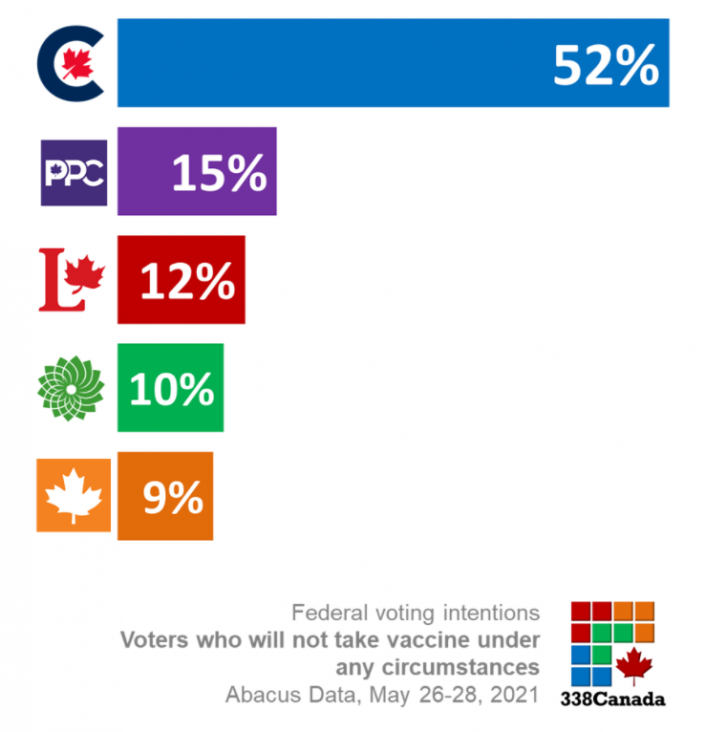Philippe J. Fournier: Unlike in the U.S, where vaccine eagerness shifts along party lines, a new poll shows Canadians of all stripes broadly support getting the shot
Vaccination against COVID-19 continues to progress well across the country. As of this writing, nearly 60 per cent of Canadians—and counting—have received at least a first dose of a COVID-19 vaccine. Fortunately, unlike our neighbours south of the border, vaccination does not appear to be as fiercely a partisan issue in Canada, according to figures from a new poll by Abacus Data.
In its most recent federal survey, Abacus Data collected data on the positions of Canadian voters regarding the COVID-19 vaccination in Canada and tabled those results according to federal voting intentions. Although we observe some differences in the figures between voters of the main federal parties, we note however that these differences remain minor.
Nationally, 80 per cent of Canadians say they have either already received a first dose or intend to get the vaccine as soon as possible. When we break down the results of this question according to federal voting intentions, we notice that Liberal, BQ and NDP voters show eagerness towards the vaccine in similar proportions. Indeed, among Liberal voters, 87 per cent say they have already been vaccinated or intend to do so. We observe comparable results for the voters of the Bloc Québécois (84 per cent) and the New Democratic Party (83 per cent).

Among Conservative and Green Party voters, this proportion drops to 73 per cent, which is admittedly a slightly lower proportion than voters of other parties, but it remains a modest difference.
In contrast, vaccine eagerness in the United States is strongly correlated with political allegiances. In fact, in a recent YouGov poll, 78 per cent of Democratic Party voters say they have already received the vaccine or intend to get vaccinated, compared to only 51 per cent for Republican voters. Additionally, only 8 per cent of Democratic respondents say they will not take the COVID-19 vaccine. Among Republican voters, this proportion climbs to 30 per cent.
These figures from Abacus Data also make it possible to bring important nuances about the rampant anti-science movement, as well as dispel some prejudices about the political allegiances of this minority of voters in Canada. Since nearly three in four Conservative voters say they have already received the vaccine or are just waiting their turn to receive it, it would be statistically wrong, or at least grossly exaggerated, to claim that voters of the CPC are “anti-vaccines”.
Consider the graph below. These are the voting intentions collected by Abacus Data from respondents who have already been vaccinated or who intend to receive the vaccine:

The Liberal Party of Canada remains in the lead with 37 per cent support in this segment of the electorate, an eight-point lead over the Conservative Party of Canada. As for the NDP, its support stands at 18 per cent. If we compare these figures with the latest 338Canada federal projections, we notice that they are well within the confidence intervals of the current averages—for each of the main parties. In this regard, vaccinated Canadians and those intending to receive the vaccine appear to be remarkably representative of the general population in Canada.
Compare these figures with the voting intentions of those who refuse the vaccine:

Among this sub-sample (of a limited size of barely one hundred respondents, and therefore with high uncertainty), voting intentions do not resemble current trends at all. Indeed, the CPC dominates with the support of nearly half of these respondents, and Maxime Bernier’s party, the People’s Party of Canada (PPC), takes second place with 15 per cent. Clearly, this demographic segment is not at all a representative sample of the Canadian population, far from it in fact.
As mentioned above, it would be statistically wrong to claim that Conservative voters are anti-vaccine. However, these figures nonetheless suggest that a significant proportion of anti-vaccine voters do lean towards parties on the right of the political spectrum.
Obviously, these numbers could certainly change over the next few months, as restrictions gradually get lifted across the country this summer. We can bet that vaccine hesitancy, those 14 per cent of Canadians (according to Abacus Data) either still waiting to get the vaccine or who claim they need to be persuaded to take it, could eventually fade as more citizens regain some semblance of freedom, and as we continue to see the clear correlation between the increase in vaccinations with the decline in infections and fatalities from COVID-19.
Article From: Maclean’s
Author: Philippe J. Fournier

